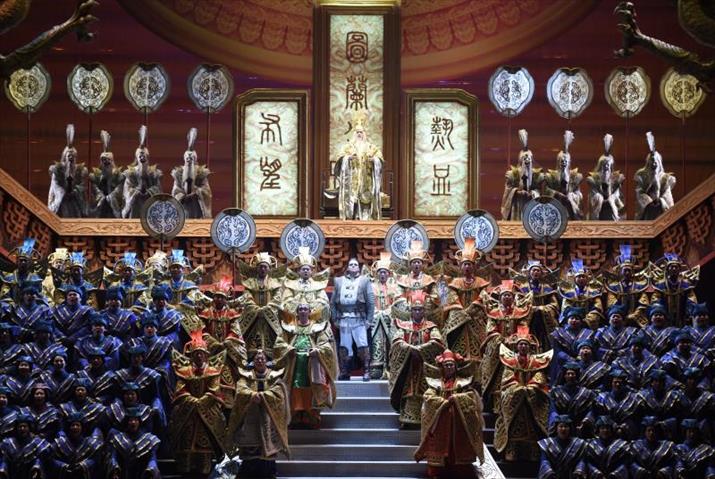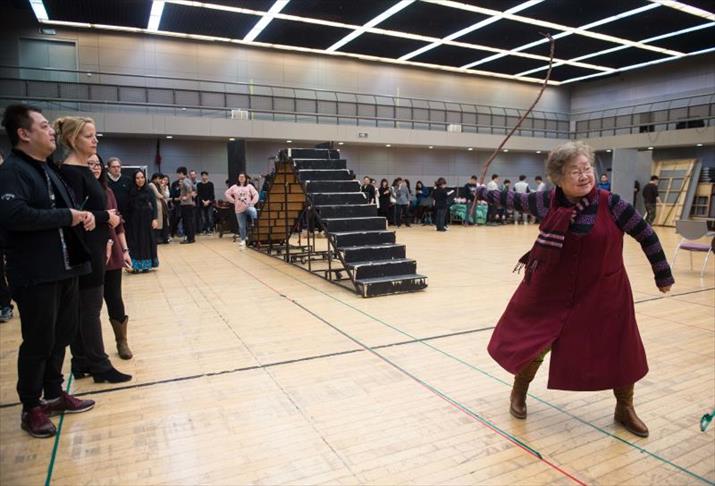| Lifestyle |
| Ice Princess Finds Love in Beijing | |
| Another Chinese director infuses new life into Puccini opera | |
|
|
 A scene from Turandot produced by the National Center for the Performing Arts (XINHUA)
It was the ninth time that Turandot, the gripping story set in China of a misandristic yet beautiful princess who caused the death of her suitors, was put on in Beijing. Yet tickets for Italian composer Giacomo Puccini's last opera, staged at the National Center for the Performing Arts (NCPA) from February 15 to 19, sold out days in advance. The first Western opera to be produced by the NCPA after its inception in 2007, Turandot stagings sold an estimated 60,000 tickets on the first eight rounds since 2008. In the latest round of staging, over 12,000 tickets were snapped up. Though regarded as one of Puccini's grandest works, the plot of Turandot, however, was colored by foreigners' ignorance of China and presented the nation in a less than flattering way, an acclaimed Chinese director said. The eponymous opera is about a Chinese princess, Turandot, who hates men and seeks to have her suitors killed. She hits upon the ploy of setting them the task of answering three riddles and if they fail, which they invariably do, the punishment is death. Though the opera starts with the beheading of the Prince of Persia for failing to guess the answers, it doesn't deter Calaf, a prince in disguise, from falling in love with the beautiful princess. Calaf decides to stake his life and venture to solve the riddles, turning a deaf ear to all who try to dissuade him, including his loyal slave girl, who is in love with him. He succeeds in passing the test but the princess hesitates to marry him. He then offers her a riddle of his own as a way out. She has to guess his name. If she succeeds, he would agree to a death sentence; if she fails, she would have to marry him. At dawn, Turandot still has no idea of the prince's name. Calaf kisses Turandot forcefully and finally tells her his real name. Yet, Turandot does not announce the prince's real name. On the contrary, she says she will marry him and his name is Love. The tale with a twist has been given a new lease of life by Chinese directors who have tried to tone down the anti-China bias stemming from ignorance. Renowned stage director Chen Xinyi has been directing the NCPA's version of the opera since 2007. The 79-year-old said that although Turandot is a classic, she didn't like it because it contains Westerners' imagination of China, which is not real, and even false at times. She pointed out that Chinese history had no cruel princess like Turandot, who caused rejected suitors to be executed. Also, Chen said the depictions of the princess she had seen in the theater and in videos showed Turandot as cold and cruel. The princess was often a corpulent figure with long finger nails, which repelled her.  Director Chen Xinyi during a rehearsal on February 8 (XINHUA)
The opera, which had to be completed by Puccini's student Franco Alfano following the composer's death in 1924 before he could finish it, also had historical facts wrong, Chen said. For instance, in the second scene in the second act, Turandot refers to the Forbidden City "several thousand years ago." However, the Forbidden City is no older than 600 years. "But in spite of the loopholes, the opera is still a great one, reflecting Westerners' curiosity about China," Chen remarked. When she accepted the task of directing the story, Chen began watching various performances of it, both in the theater and in videos. She came across a translation by a music scholar from Taiwan. Chen said she was awed by the eloquence and literary merit of the version and tried to interpret the story from the perspective of the difference between Renaissance philosophy and Chinese feudal culture. When Puccini was composing the work, Italians' understanding of China was primarily based on one book, The Travels of Marco Polo, and one historic event, the invasion of Beijing by forces of Britain, Germany, the United States, France, Tsarist Russia, Japan, Italy and Austria in 1900. Therefore, Puccini's work contains both curiosity about the Yuan Dynasty (1271-1368) and admiration conveyed in Marco Polo's travelogue as well as mockery of the degenerate and declining Qing Dynasty (1644-1911), China's last imperial dynasty. That's why some stage versions have cast Turandot as Empress Dowager Cixi, the de facto ruler of China for nearly five decades till she died in 1908. In contrast, in her interpretation, Chen seeks to emphasize that beneath the apparently icy veneer of Turandot there flew both hope and blood, which were also the answers to two of the princess' three riddles. Her cruelty had a reason. In her way, she was seeking to avenge Lou-Ling, her ancestress who had ruled her kingdom "in silence and joy, resisting the harsh domination of men" until she was ravished and murdered by an invading foreign prince. Turandot thought Lou-Ling lived in her, and so swore to never let any man marry her. However, the opera sees her redemption. Turandot is softened by the love Calaf's devoted slave girl shows to him, preferring to die under torture rather than betray him. She is also moved by Calaf's love for her, which is the answer to his riddle. "Puccini believed that love could change everything and solve all problems," Chen said. So when it was her turn to direct the opera, Chen selected Sun Xiuwei, an overseas Chinese soprano who suited her imagination of Turandot, projecting her as a vulnerable woman underneath the steel exterior. U.S. soprano Lise Lindstrom and Sun alternately performed Turandot's role while Italian tenor Marco Berti and his Chinese peer Warren Mok played Calaf by turn in the February show. Conductor Lu Jia, tenor Tian Haojiang and Sun have been with the show since its debut in 2008. Chinese composer Hao Weiya wrote an 18-minute ending for Puccini's draft of the opera, which ends with the slave girl's death, becoming the first Chinese composer and the fourth in the world to do so. Chen is not the first Chinese to direct the opera. Famed film director Zhang Yimou delivered a version at the Beijing Working People's Cultural Palace in 1999. Zhang did an encore at the National Stadium in 2009 when the performance was earmarked a budget of 120 million yuan ($17 million). Another version by Chen Kaige, who has directed such films as Farewell My Concubine, the 1993 classic that draws heavily on the Chinese opera world, was staged in Guangzhou in south China in 2010. Chen Zhiyin, Deputy Editor in Chief of Music Weekly and music critic who has watched the NCPA version five times, said Chen Xinyi has succeeded in plugging the disconnects in the original plot to make it more reasonable and less abrupt. Also, she has brought the story closer to the Chinese by adapting to Chinese ways of expression and taste. This unique interpretation of a Western classic by Chinese artists will bring more international attention in future. Copyedited by Sudeshna Sarkar Comments to jijing@bjreview.com |
|
||||||||||||||||||||||||||||||
|